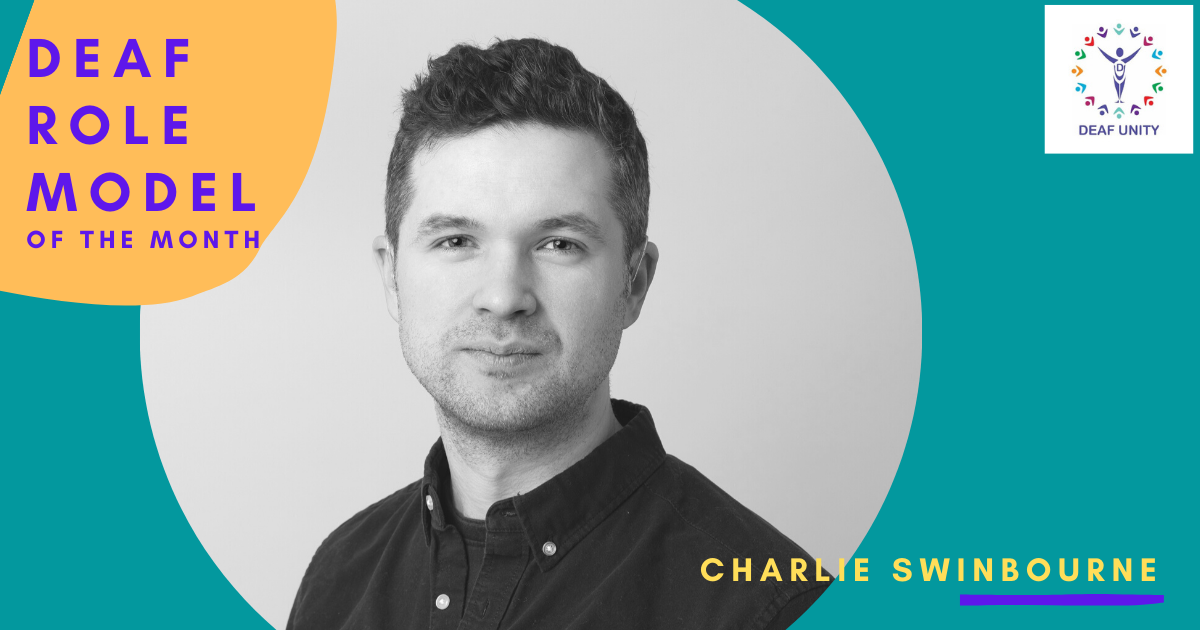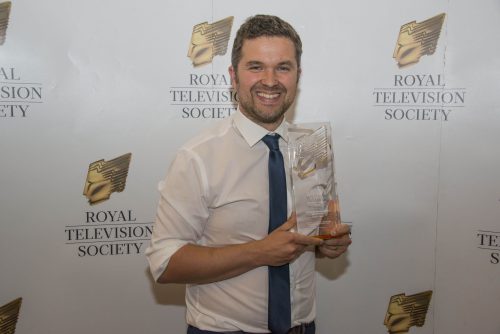
Each month we invite an inspirational or outstanding deaf role model to share their story. From what they’ve learnt, to what they wish they’d have known and their best deaf tips.
This month, meet Charlie Swinbourne, a partially deaf director, writer and journalist with a passion for telling deaf stories, and bringing the real life experiences of deaf people to the forefront.
Find out more about Charlie and his work here.
1. Hi Charlie! Tell us about yourself?
I’m a scriptwriter, director and journalist, often making work related to deafness. My main thing is writing. I’m a creative person, thinking of ideas and writing them down so that they become something, whether that’s a script, a programme, or a blog.
2. What is your deaf story?
I’m partially deaf and I grew up in a deaf family. When I was little, we mainly communicated in English by lipreading, although I could communicate well with deaf people at the deaf club we went to.
We used more and more sign language as I grew up. I often feel like I’m in two worlds – I’m most comfortable with other deaf people, but I also went to mainstream school and still have close hearing friends. At times in my life, I’ve wondered where I fit in but in recent years I’ve become more comfortable at realising I’m a bit of both.
3. What is your experience of British Sign Language?
My youngest brother is autistic and uses BSL as a first language, so we used BSL more and more as I was growing up. My signing receptive skills were already good, but then we learned the language more formally, which we loved doing.
When I was in my early 20s, I started working in deaf media and that was when I made more deaf friends of my own age and saw them more regularly – and my signing improved further from then on.
4. What was your experience of education as a deaf person?
My feelings on my education are mixed – perhaps in some ways I was seen by teachers or professionals as some kind of ‘success’ within the mainstream education system but the reality was I had to work very hard every day just to follow the lessons, and to be able to interact socially with people in my class at school.
I don’t think hearing people can understand the relentless amount of concentration involved to be able to get by in mainstream education. And when you’re the only deaf child in your year at school, what you don’t really get is a sense of deaf identity or positivity.
Like many deaf children in mainstream education, I worked very hard to appear as ‘hearing’ as I could, pretending I could hear things I had missed, trying hard not to make mistakes when I misheard something. It was exhausting.
On the positive side, I made some very close friends, who I still have today.
On the down side, I think in the years after school, I had to find myself again, and look for a new way of looking at my own deafness and myself as a person, in a more positive way.
I’m glad I was able to do that, but I feel strongly that it would have been better for me (and for other deaf children) to have been given some of that positivity and deaf pride earlier on in my education.
5. Have you faced any obstacles or challenges from being deaf? And how have you overcome these?
Yes I have! I’m not sure whether they are always ‘overcome’ – I think you just do what you can, the best you can, to keep going and take the next steps forward.
What are the barriers? People’s attitudes, lack of access to communication, lack of a network sometimes.
There are many ways to try and deal with them – to anticipate attitudes and find ways of countering them, for example, or to make sure in advance that communication support is there.
But you can’t anticipate everything and there have been times I’ve found myself in difficult positions, in my career, and several times I’ve had to walk away from projects or people simply because they weren’t able or willing to change.
I don’t want to be negative, I’ve had positive experiences too, but being honest, the barriers are always there, it’s a reality. I find that being prepared for them, and doing the best work I can, is the best way to deal with them.
6. Can you tell us how your work as a deaf scriptwriter has helped you to express the experiences of the deaf community?
I think that through my work, through short films like ‘Coming Out’, or a drama like ‘My Song’, the ‘Found’ documentaries, my sketch show ‘Deaf Funny’, or the recent Casualty episode I co-wrote, I’ve found new ways of expressing some of deaf people’s experiences in life, which has had an impact, and that’s something I’m really proud of.
Although I’m proud of what I’ve done, I’m also excited about seeing new deaf writers come through, and I’ve been doing more work on script development with them, which I’ve really enjoyed.
There are many ways of being deaf, many types of deaf people, and what we need are more deaf people’s stories – not only the stories I’ve told – in order to give a stronger sense of our lives, culture and the way that deafness makes our lives different.

7. Has growing up in a deaf family enabled you to be more confident?
I’m always very comfortable with deaf people, I feel at home with them. That is what growing up in a deaf family gave me. My family also supported me through thick and thin, always believing in me and that has given me a lot of confidence in some areas of my life.
I think that being confident in the hearing world is a different thing. It can depend on the people you’re working with, or the environment you’re going into. Sometimes I think I appear to be quite confident, when the reality is that I might be as nervous as anyone else – I just try to hide it!
8. In what way do you think your work has an influence on the deaf community?
I hope that my work has helped people understand deaf people and deaf culture better – to know more about how deaf people feel and who we are.
I think drama and comedy, and documentaries are incredible forms of communication, because they make people relate to the people they are watching. I think that when people see our stories, it changes their perception of us. That’s why we need more of it!
9. Your work as a journalist has involved editing for ‘The Limping Chicken’ and exposing the scandal surrounding Nelson Mandela’s memorial service. What progress do you think still needs to be made for deaf people accessing and working in Media?
I think that there needs to be more deaf people working in every organisation, at every level, in different areas of media – such as journalism, TV, film, and so on. That way, more hearing people will understand us, because they will know us.
At the moment, the media industry is realising it needs to change. It has a poor track record in diversity, whether it’s race, sexuality, gender, disability. Wanting to change and actually changing are different things, though. It’s fine to set up an equality scheme but the big thing is actually seeing deaf people as equals and giving us the opportunity to show what we can do at the highest level.
10. You have contributed to several high profile programs, including Casualty and Eastenders, as well as creating your own comedy and drama programs. What has been the highlight so far?
I would say my highlight for me was my first ever script, ‘Coming Out’, which was directed by Louis Neethling in 2007. The story had popped into my mind a couple of years before, when I was a long way from having a media career.
Seeing ‘Coming Out’ appearing on the big screen at the London Deaf Film Festival was a truly exciting, mind-blowing experience, seeing people reacting to it, talking about it. I was struck by the power of a short film.
That was the first script I’d had made and it really encouraged me to do more, and set me on the path to where I am today.
11. How could your work inspire a new generation of deaf writers?
I hope that people will see my work and the work of other deaf people and realise we can tell our stories, and make an impact. Hopefully that happens, I would love to see more people coming through.
12. What makes you proud to be part of the deaf community?
What I love about the deaf community is the language, the warmth, and the humour. Seeing deaf people laugh at a funny story, meeting lots of different types of deaf people.
The way deaf people are so open and direct with you, and the way they ask questions a hearing person would never ask!
I think just the way deaf people are different from hearing people, is really special. I’m very proud to be in this community.
13. Who inspires you and why?
What inspires me most is people who look out for others, who think about other people and have empathy for them. Whether they’re deaf or hearing. I’ve been very lucky to have some people look out for me, support me and give me opportunities and I think that’s an incredible quality to have, and that’s what I aspire to.
Some of the most inspirational people I know are teachers – especially deaf teachers. My wife and some of my close friends are Teachers of the Deaf and the hope and guidance they give their deaf students, which changes their lives, is incredible.
14. What ways do you think hearing people can be allies to the deaf community? Any DOs and DON’Ts?
It’s such a balancing act, which makes this a very hard question to answer. I would say this:
- Don’t speak for us, but listen to us and support what we want to say.
- Don’t appropriate us by using our language or culture for your own personal benefit.
- Don’t speak down to us or assume we are less capable.
- Don’t tell us that you know better than us what our needs are.
- Believe us when we ask for the support we need, to be able to communicate or be an equal in the room.
15. 3 top tips for deaf people?
- Try and see things from other people’s perspectives, not only your own.
- Accept that you’re not perfect and you will make mistakes, but try to learn from them and do things better next time.
- Work hard, as hard as you can, while taking care of your body and mind. Keep taking the next step you can, because each small step forward will help you on the bigger journey.
(I should add that I don’t always follow all of my own advice perfectly… but I’m trying!)
Looking for more support? We’ve made it our mission to improve the lives of deaf people everywhere. Check out Deaf Unity’s projects to find out what we can do for you. If you’d like to get in touch, contact us here.


Really interesting . Thanks for sharing your thoughts
Very proud of your achievements from your admirer